
Utah Officials Spent $322,000 in Covid Aid on Snow Tubing Hill
October 25, 2021
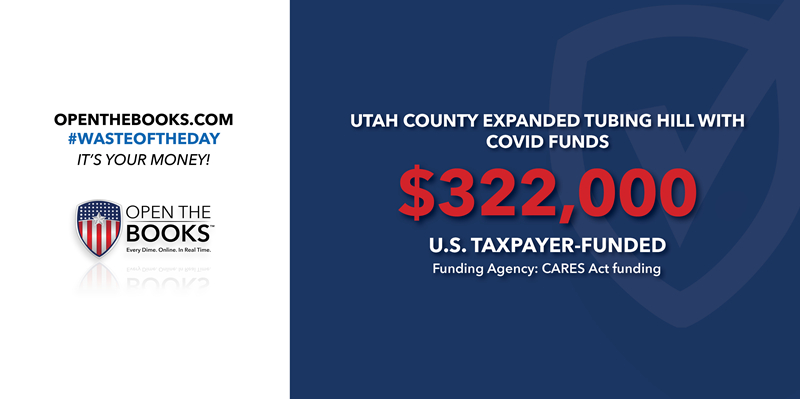
While most municipalities around the country were concerned with how their residents would pay their bills during the Covid-19 shutdowns, Uintah County in Utah was spending its relief funds on a snow tubing hill.
Uintah County received $5.1 million in CARES Act funding for Covid-19 relief, and public records show the county spent at least $322,000 on the Buckskin Hills Ski and Snow Tubing Hill, the local CBS affiliate KUTV reported.
That spending caused several anonymous whistleblowers to report it, which spurred an audit on the 2020 finances by the Utah Office of the State Auditor.
The snow tubing hill was just one of several examples of the commission circumventing the public procurement process in 2020, the audit found.
When the commissioners bought six snow guns for the tubing hill at $19,999 each, they were one dollar below the threshold that would have required soliciting bids, the newspaper reported.
“We didn’t build a tubing hill with the [CARES] money, we expanded the tubing hill,” Commissioner Bart Haslem told The Tribune, saying the expansion was need during the pandemic for “spacing, getting people outside.”
Of the $5.1 million, almost $3.5 million went to business recovery grants, but officials didn’t verify whether applicants had been impacted by the pandemic, the audit found.
That led to $117,000 going to “companies owned by certain county officials and their immediate family members,” the audit found.
Haslem’s son received $20,000 for his aviation business and Haslem’s wife received $20,000 for her travel business, the Tribune reported. Commissioner Brad Horrocks’ sons also received a total of $77,000 for their RV, farm, energy and hunting outfitter businesses, the Tribune reported.
Thankfully whistleblowers in Uintah County are watching out for taxpayers when officials run amok with their money.
Biden’s ‘Zero’ Cost of the $3.5T Reconciliation Bill Was a Phony Number
October 26, 2021
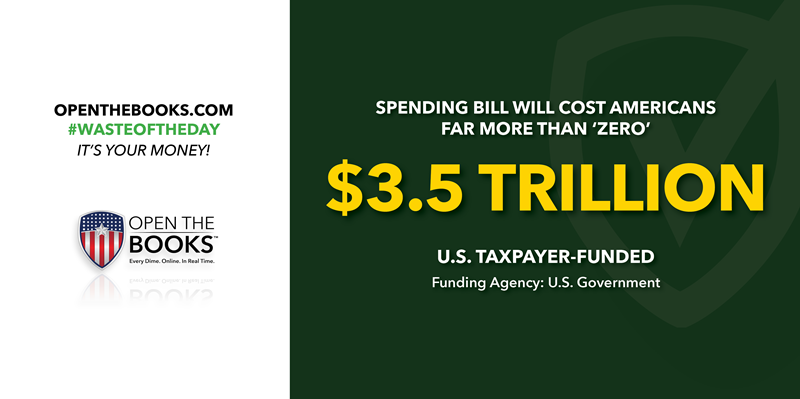
President Joe Biden said the price tag of the $3.5 trillion “human infrastructure” spending plan dubbed the Build Back Better Act is actually zero, a claim Reason Magazine calls “dubious.”
"We talk about price tags. It is zero price tag on the debt," Biden said. "We are going to pay for everything we spend."
Not only is it not zero, but the $3.5 trillion figure to fund the expanse of social services “is a phony number,” according to the Wall Street Journal editorial board.
The spending plan was “full of delayed starts, phony phase-outs, and cost shifting to states designed to fit $3.5 trillion into a 10-year budget window that can pass with a mere 51 Senate votes,” the editors wrote.
For instance, a Medicare expansion includes new vision and hearing benefits over the next two years, costing about $20 billion a year. But a much more expensive dental benefit will be pushed back to 2028, where the costs explode, the WSJ said.
A child tax credit expands the current $3,000 to $3,600 per-child payments for a decade, costing about $1.1 trillion. But as that credit is sure to be extended indefinitely, it will cost $110 billion each year.
While Democrats say the $3.5 trillion will be paid for with tax increases, savings from changing how Medicare and Medicaid buy pharmaceutical drugs and with future economic growth, Reason points out that federal government hasn't fully paid for its regular spending since 2001.
The Congressional Budget Office projects that there isn’t a single year in the next 30 in which the budget will balance.
That $3.5 trillion sure sounds like “a phony number.”
NASA Facing Massive $2.7 Billion Cost Overruns at Its Facilities
October 27, 2021
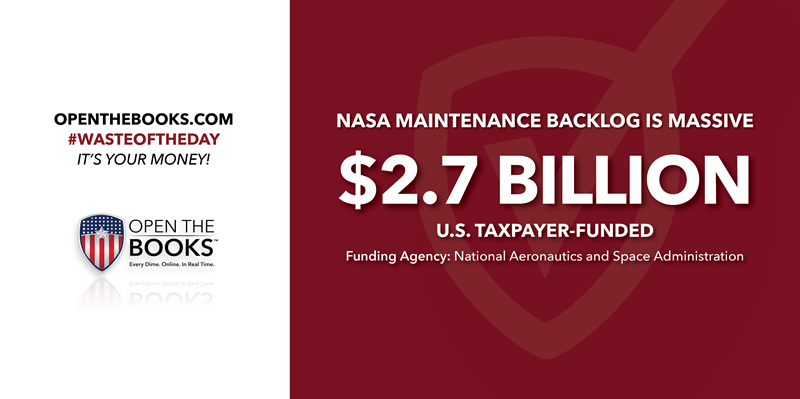
The space race between private companies continues with actor William Shatner flying to the edge of space on Blue Origin’s New Shepard 4 vehicle and SpaceX recently sending a civilian crew to space. While the competition between Blue Origin and SpaceX heats up, NASA is taking a back seat as it faces billions of dollars in project overruns.
While the National Aeronautics and Space Administration manages $40 billion in facility assets, more than 75 percent of it is beyond its design life and NASA faces a deferred maintenance backlog of $2.7 billion as of 2020, according to a recent report on cost overruns from NASA Office of Inspector General.
The IG reviewed 20 construction projects and found that six had “significant cost overruns” and 16 took or will take longer to complete than initially planned.
It looked at six projects at Glenn Research Center, Kennedy Space Center and Langley Research Center “that were significantly over budget as of June 2021.”
Cost increases ranged from $2.2 million for upgrades at Glenn to $36.6 million for repairs and modifications at Kennedy, the report found.
The increased costs for two of the projects were attributed to changing requirements, while contract prices for four others were either higher than originally estimated or resulted from disagreements between NASA and the contractor, the IG report found.
NASA didn’t provide effective oversight to determine whether the projects met cost, schedule and performance goals, the report found.
A second NASA IG report estimated that delays from the Covid-19 pandemic cost nearly $3 billion.
Pandemic delays aside, NASA’s cost overruns can’t be accepted as the norm when private industry is passing up our taxpayer-funded space program almost daily.
In 1979, a USDA $340,000 Study Tried to Understand the Vegetarian Lifestyle
October 28, 2021
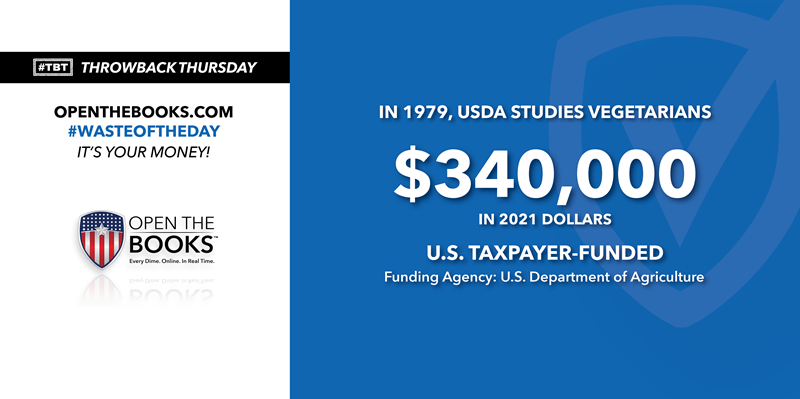
Throwback Thursday!
In 1979, the U.S. Department of Agriculture was given a Golden Fleece award for spending $90,000 — $340,000 in 2021 dollars — on a two-year study to understand vegetarianism as a lifestyle.
Sen. William Proxmire, a Democrat from Wisconsin, gave the awards to wasteful and nonsensical spending, in this case for the study “Behavioral Determinants of Vegetarianism.”
The study hoped to allow researchers to understand behavioral determinants surrounding vegetarianism as a lifestyle, Proxmire said in his awarding of the Golden Fleece in 1979.
Researchers wanted to “differentiate behavioral and attitudinal differences regarding nutrition, food, self, and society between vegetarians and non-vegetarians” among other things.
A better understanding of what motivates people to be vegetarians can help the government forecast appropriate modifications in food and nutrition policies, the studies proponents said at the time.
“In my view, this subject is just not meaty enough to warrant such an expenditure of federal funds,” Proxmire said. “The taxpayers may, in fact, be getting something for their money which is neither fish nor fowl.”
He said he doesn’t object to people being vegetarianism and applauds it but the USDA doesn’t need to be involved.
“The key word is priorities,” he said when giving the award. “In this period of rampaging inflation, it is imperative that taxpayers' dollars be spent only on those projects and purposes which are at or near the high-priority end of the spectrum. This study does not, in my view — and it is a view shared by the/FY-80 agriculture appropriations conferees — meet that test.”
$1T Child Tax Credit Is Really Universal Basic Income
October 29, 2021
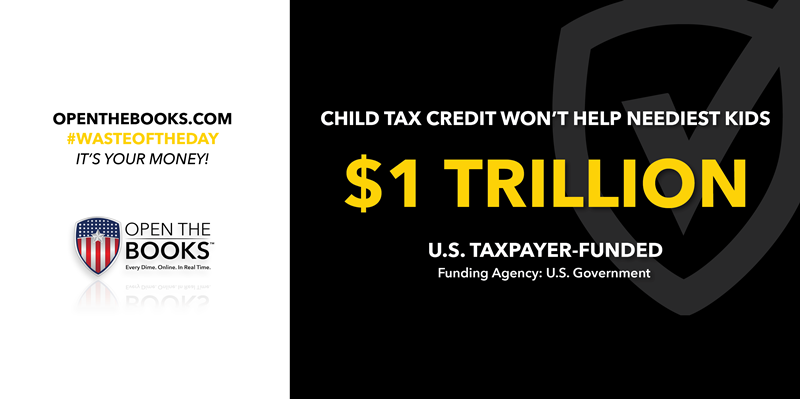
In the Democrat-backed $3.5 trillion Build Back Better Act that funds so-called “human infrastructure,” is money categorized as a child tax credit but acts as a universal basic income for people with children.
This expansion of the social safety net is a “turbocharged child tax credit that is really a universal basic income, which will discourage work and cost $1 trillion,” The Wall Street Journal editorial board said.
While the bill extends the tax credit through 2025, the editorial board argues neither Republicans nor Democrats running Congress or the White House will ever repeal it.
Democrats expanded the 2021 credit to $3,600 for children under age six and $3,000 for older dependents as part of the March Covid-19 relief bill.
It was an increase from the $2,000 that Republicans offered in their 2017 tax reform plan, which was an increase from $1,000.
Since it’s a “refundable” credit, it’s paid in a check to those who don’t owe any income tax.
In July, the IRS started paying part of the credit in monthly checks, “all the better to get recipients hooked on regular government payments,” the WSJ editors said. “It has kicked free of any connection to income or taxes and is now a full-fledged entitlement.”
Some proponents argue it could cut child poverty in half.
However, Robert Doar, who ran welfare programs in New York, warned that sending families checks without considering the circumstances of a household could make families appear less poor on paper but could do little or nothing to actually change their circumstances.
In America today, there are 10 million jobs and not enough workers to fill them. Instead of paying people to stay home, people should get a job.
The #WasteOfTheDay is presented by the forensic auditors at OpenTheBooks.com.